#journey to bethlehem can we make this work
Text
Watch Movie : Journey to Bethlehem
youtube
Watch Full Movie Now : https://tinyurl.com/h6pmuty2
#journey to bethlehem#journey to bethlehem songs#journey to bethlehem movie#journey to bethlehem trailer#journey to bethlehem soundtrack#journey to bethlehem milo manheim#journey to bethlehem in my blood#in my blood journey to bethlehem#the cast of journey to bethlehem#journey to bethlehem brand new life#brand new life journey to bethlehem#can we make this work journey to bethlehem#journey to bethlehem can we make this work#movies#Youtube
1 note
·
View note
Text
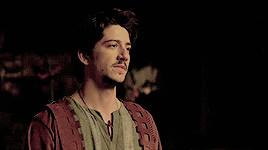
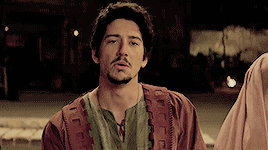




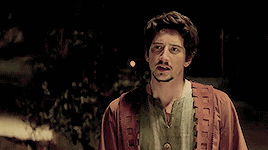
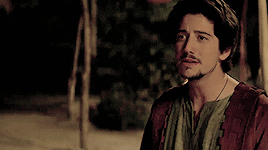
#milo manheim#journey to bethlehem#can we make this work#milomanheimedit#mmanheimedit#5 and 6 are a moment
137 notes
·
View notes
Text

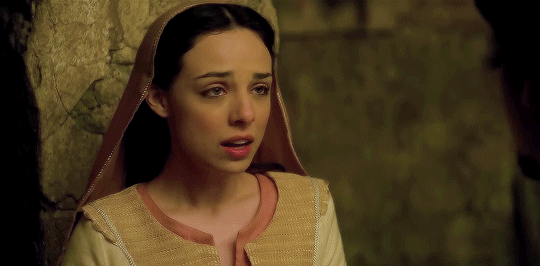
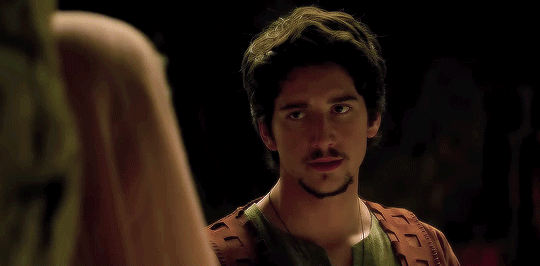

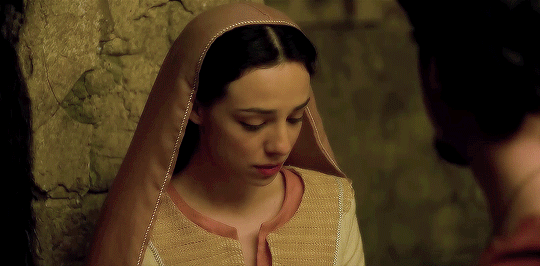
Can we make this work? I know trying feels insane
JOURNEY TO BETHLEHEM (2023), dir. Adam Anders
#fiona palomo#fionapalomoedit#milo manheim#milomanheimedit#journey to bethlehem#movieedit#*#my last one i swear#filmgifs#moviegifs#fyeahmovies#tvandfilm#💕
198 notes
·
View notes
Text
Can We Make This Work?
Warning: spoilers for episode 6
A/N: This was requested on wattpad and is tangentially related to my fic, An Angel in Demon's Clothing, but takes place in a separate continuity.
The reader is a mortal angel who volunteered to go to Hell to help with Charlie's redemption project. Charlie and Vaggie are the only ones in Hell who know the reader is an angel, and the reader's mission is a secret that Adam and Lute don't know about.
Song is from Journey to Bethlehem.
--
You'd returned to the Hotel earlier than the others, overwhelmed by Consent's loud music and bright lights. Not to mention the many, many flirtatious demons making passes at you. So you were the only one around when Charlie and Vaggie returned from their meeting.
They returned a bit sooner than you would have thought they would. That's the first red flag.
"You're back early!" you observe, puzzled, and approach the two demonesses slowly.
Immediately, Charlie distances herself from Vaggie, a look of panic and betrayal in her eyes. "Why didn't you tell me you were an angel? An exorcist?!" she wails.
You blink in shocked silence. Vaggie is an angel? Why hadn't you met her before you came down here?
Vaggie tries to approach Charlie, holding her hands out in a soothing gesture, but the demon princess only backs away.
Slowly, you shake yourself out of your stupor. "Wait, what's going on? Why are you guys back so early?"
The two shoot their gazes to you, as if they'd only just noticed your presence. Vaggie looks anxious and somewhat defeated, and Charlie is nothing short of distressed. Charlie runs to you, crushing you in a desperate hug, before dragging you up to the Hotel's penthouse suite.
Leaving Vaggie behind.
You're growing more concerned by the second. "Charlie, what happened?" you ask, stumbling beside her as she continues to cling to you.
She bursts into tears, gripping you tighter. "They wouldn't listen!" she sobs, "Adam wouldn't listen! Vaggie's an exorcist and has been lying to me this whole time!" She releases you, turning to pace around the suite in a tearful panic. "And the meeting was a disaster! The Angels don't even know what it takes to get into Heaven! And now the extermination is in a month, and Adam says he's coming for the Hotel first!"
The last bit of news shakes you to the core and you blanch. "What? Why? Why would he do that?! Is he even allowed to make targeted attacks?" You try to calm yourself. Panicking won't help, Charlie needs you calm.
You hear a thump, and whip your head around to see that Charlie has fallen to her knees by one of the windows.
"How could I be," she sings in a soft, defeated voice, "Oh, so naive?" She wipes at her face with her sleeve as you approach to try to comfort her.
"Foolishly thinking there's more to this life for me," She tearfully looks out the window with a doleful expression as it begins to acid rain on the hellscape below, before glancing back at you. "Two broken hearts," she lilts, holding a loose fist to her chest, "Right from the start,"
She turns away from the window and curls up in dejection, bringing her knees to her chest and wrapping her arms over them, "Watching the dreams that we have as they fall apart,"
You pause in your efforts, hit with the overwhelming emotion emanating from the princess you've come to know as your friend.
"This will never work," her voice sounds almost bitter as she sings, burying her face into her knees, "Even trying feels insane. This will only hurt,"
She turns her head, looking at you expectantly, "Don't you feel the same?"
You sigh. "I feel it too," you admit, joining her in song and making the last few steps to her side, "But what can I do?"
You kneel down next to her, gazing at her from the corner of your eye, "I'm just the stranger they say is the one for you,"
"Maybe with time," you sing, taking Charlie's hand in yours, thinking about Adam, your home in Heaven, and the second home you have in Hell, "Something will change? Making the best of this might be the only way.
"Can we make this work?" you stand, gently helping Charlie up as you do. Looking out the window yourself, you take in the oddly beautiful landscape of Hell.
Charlie joins in and the two of you sing together: "Even trying feels insane."
"Maybe when it hurts," your eyes and voice harden with determination. Things seem grim, but you aren't giving up on your mission. Both Heaven and Hell depend on it. You turn to face Charlie, "We'll be worth the pain."
"There are too many questions, Too little time," Charlie points out. "Too much to ask for, The rest of my life."
You join in with her in agreement, both of you singing, "It's a mountain too high to climb,
"Too many voices filling me with doubt," the two of you can hear them: Adam, Lute, Alastor, the newscasters at 666 News, Sera, even your first patient, Angel Dust. "Can you hear them now?"
"It's hard to have faith," you admit.
"It's hard to believe," Charlie agrees.
"Our future holds more Than what we can see," you sing together.
You take Charlie's hands, "We have to trust what we don't understand," you resolve, and Charlie joins in;
"It could be a part of God's plan."
"Can we," you sing, pulling Charlie into a dance, hoping to encourage her.
"Can we," Charlie echoes, falling into step.
"Make this,"
"Make this,"
"Work?" you finish together, before twirling around, "I know trying feels insane."
"Maybe," you lead the princess of Hell in graceful steps, freeing your true angelic wings. They give off a silvery shine as the two of you dance together.
"Maybe," you can see the stars, feel the cosmos.
"When it,"
"When it," God's Plan would come together with time.
"Hurts," the two of you sing with resolve, "We'll be worth the pain!"
"Can we make this work?" you pull Charlie into a hug as the two of you wrap up the song, "Can we make this work?"
You tuck your true wings away as you end your dance, sending Charlie a gentle smile as their light disappears.
"We'll get through this," you tell her, "I don't know how yet, but we'll get through this."
"Okay," Charlie breathes.
"We should talk to Vaggie," you give a gentle suggestion, "I didn't know she was an angel, either; I've never met her in my time in Heaven, but I'm sure she had an at least somewhat good reason to hide it. Besides, she's probably having a rough time right now."
"You're probably right," Charlie admits reluctantly.
You give her a wry smile, "Come on, there's no way to fix this without communication."
So you and the princess of Hell leave the suite with a new resolve.
#hazbin hotel reader insert#hazbin hotel x you#hazbin hotel fanfiction#hazbin hotel x reader#hazbin hotel#hazbin hotel spoilers#hazbin charlie#hazbin hotel charlie#platonic reader insert#charlie & reader
94 notes
·
View notes
Text
La bellísima sirenita gatita @littlekittenmermaid recommended a second song. This is from the musical Journey To Bethlehem.
We Become We, by Fiona Palomo and Milo Manheim
This is why she recommended this song:
"And this one, it's soooo cute!!! It's funny cause it is from a musical. It is basically the navity on a musical 🤣 buuuut that song is just so romantic and cute, their voices are so soft."
youtube
This truly is a sweet song, and the harmonies are so beautiful. This will definitely be added to my playlist.
Here are the lyrics:
Can we become we
No longer known as just you and me
Two separate lives now in unity
Stuck here together but
Will this always be just an arrangement?
Can we become more
Than half of a union we're chosen for?
Where I am your best half
And I am yours
Stuck here forever
And hopefully not ending in estrangement
It's the step of faith
We have to take sometimes (if I'm with you, I can take it)
But if we are one
What happens to you and I? (If I'm with you, I will make it)
Will this always be just an arrangement
We'll find out in time if we don't break it
Can mine become yours
Combining our dreams
Without keeping score?
Always together, but never bored
No choice in the matter but
This will never work without each other
Can we become we? (Can we become we?)
Start a new line on this family tree
Two hearts connected by one beat
Your hand in mine and
I could never choose to love another
Maybe one day I can learn to love you, too
#music video#new music#music#ask me questions#ask me stuff#ask me things#ask me anything#ask#journey to bethlehem#Youtube#fiona palomo#milo manheim#for you
4 notes
·
View notes
Text
Sorry that I haven't been posting, 2023 has been a crazy year and im so glad it's now 2024!! anyways, loved this movie so much. I'm very picky with movies so I was pleasantly surprised to find such a good movie and I definitely recommend it. Even if you're not religious it's still good cause it's history nevertheless plus the songs are fire 🔥
Antipater is my favorite character ngl I love complex characters and my second favorite character is Fig of course lol
10/10 will be rewatching it every year.
It's called Journey to Bethlehem just in case you missed it btw, oh and my favorite songs are ultimate deception and in my blood & can we make this work. Here's behind the scenes pics:
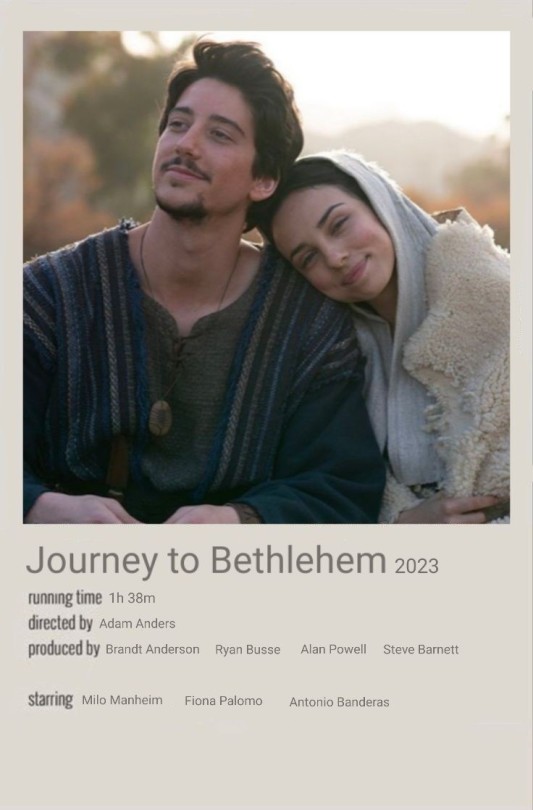
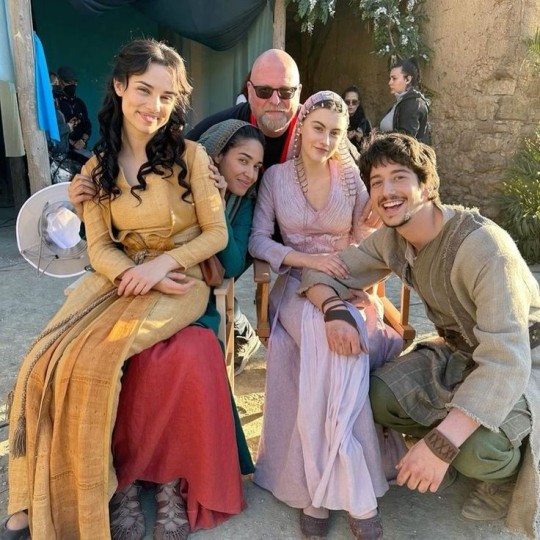

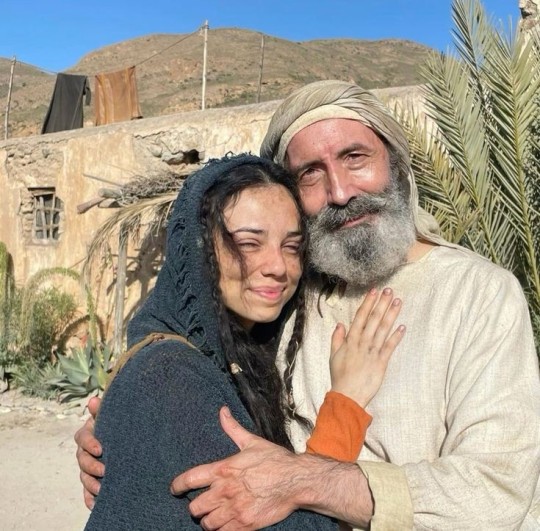
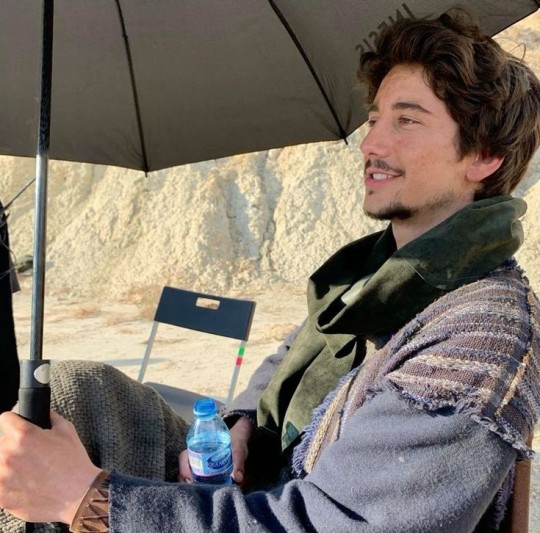
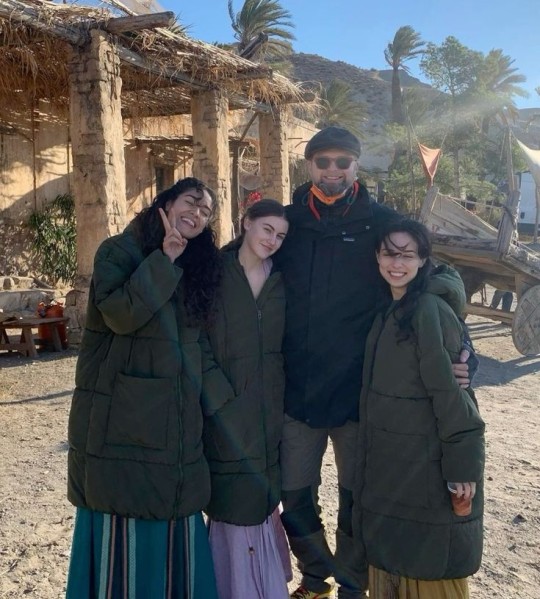
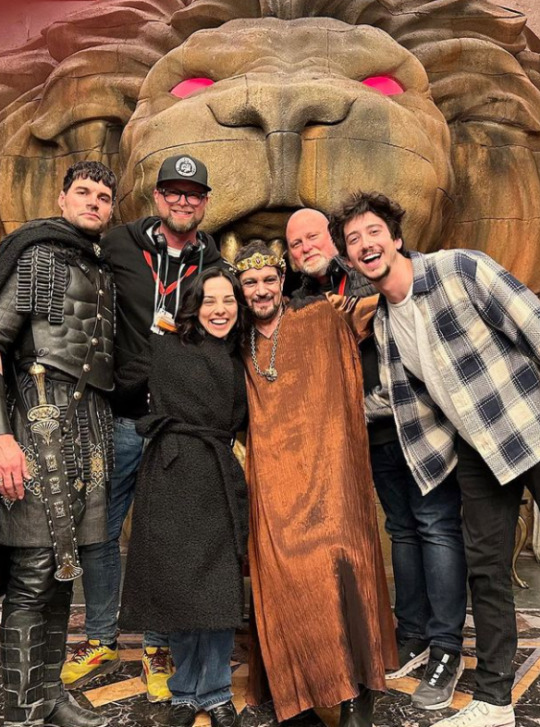


#fypage#fyp#fy#best movies#movies#journey to bethlehem#must watch#history#bible#amazing movie#movie review#movie recommendation#behind the scenes
6 notes
·
View notes
Text
Wills Loyd and Hanford - 10/31/22
Hanford, E. (2021, January 25). Why aren't kids being taught to read? Why aren't kids being taught to read? | Hard Words | APM Reports. Retrieved October 29, 2022, from https://www.apmreports.org/episode/2018/09/10/hard-words-why-american-kids-arent-being-taught-to-read
Big Ideas:
Reading does not come to the brain naturally, must be drilled explicitly
The school's literacy instruction they observed is simply, awful
There is a debate on whether children should be taught phonics or how to read whole words when first learning to read
Nuggets:
I found a lot of things throughout this text very interesting. It gave me a whole new perspective to literacy education that I never thought about before.
I never realized that reading is not something we do naturally, and that we do not pick it up automatically
I was so interesting to me how the Bethlehem schools taught their reading instruction, it made me feel really bad for those kids, but I am glad they were able to turn it around
------------------------------------------------------------------------------
Wills Loyd , J. (2021). Smoke Signals In Reading Education . specialeducationtoday.com. Retrieved October 29, 2022, from https://www.specialeducationtoday.com/p/smoke-signals-in-reading-education
Big Ideas:
There is an ongoing debate on whether beginning reading instruction should promote fundamental or higher order skills
There is a three cue method of using semantic cues, syntactic cues, and orthographic cues to help beginning readers pronounce words when they are reading
Systematic and explicit instruction help learners know what to do and helps them to understand the fundamentals
Nuggets:
I never really thought about there being so many debates on literacy, and ones that are so heated too
I knew that systematic and explicit instruction was very important from talking about it in Instructional Design, but I did not realize the specific benefits that it offers to students
------------------------------------------------------------------------------
Readerly Exploration: Hanford- (Choose an excerpt from your assigned reading and share with a family member to get their insight and perspective on it)
When taking a look at Hanford's article, there was so many interesting things that stuck out to me while I was reading. The observations from the Bethlehem elementary schools was mind-blowing to me, and it really forced me to reflect on my own teaching and what I am currently seeing in my field experience. I had already talked to my mom about literacy in the past, but since I had him with me I wanted to ask my boyfriend, Caleb about this article. He has heard me talk a lot about literacy and about my experiences in education and has taken an interest in it himself. Even though he does not have any experience, he loves to chime in and talk to me about his own opinions in education. He works in HVAC, so he does not have any direct experience with education other than his own educational journey in school, but he is very opinionated and was excited to talk to me about this. When I asked Caleb about his opinion on this, he responded with a very long-winded answer.
"I think teachers should teach how to read whole words to beginning readers because it allows them to have a basis to base all their knowledge off of when it comes to literacy. For example, if you know the word "know" you can build a lot of words off of that just by knowing that root word such as "known," or "knew." Phonics does not allow that to happen right away. Phonics is not an exact way of learning in my opinion, because words make different sounds on their own versus when they are put into words. There are so many rules to phonics that you cannot cover all of them when you are teaching sounds to beginners. Consonants and vowels make different sounds when they are paired together versus when they are not," Caleb said.
My mom ended up chiming in on this anyway after hearing Caleb and I talking and having a small debate about this (yes, it got intense). My mom said, "My opinion from the way I learned in school versus the way you learned [Me, Morgan], I felt like kids were way further ahead doing phonics as shown by the kid writing you did in kindergarten. There was a dramatic improvement in you [Me] and your classmates writing and spelling skills by the end of the year. I felt kids were way further ahead going into first grade knowing how to communicate already and how to write that someone can understand what they are writing." My youngest sister even chimed in as she walked in the door from volleyball practice, and she agreed with my mother.
I am really glad this sparked such a great conversation between some of my family members and Caleb, because this is something I was really interested in after reading, and really got me thinking about which strategy is better when teaching beginning readers how to read and how to write. This will definitely be in the back of my head, and I was really intrigued by the article and by the conversation. It was nice to drag someone else into my world of education and talk about that.
Evidence:

Here is Caleb and I talking about the article by Hanford
2 notes
·
View notes
Text
More than a legend

Many in-the-public-spotlight people will hire a publicist to make them look good. Although this publicist can try to direct the public’s opinion, they cannot control the actual word on the street about their client. What people are talking about in their private conversations is closer to the truth than the publicist’s spin.
Some skeptics of the claims of Christianity have tried to claim that the New Testament is really a publicity stunt: That the New Testament authors wrote their documents to try to control the narrative of the story of Jesus. But I find it fascinating what people were saying about Jesus from His birth—before He ever preached a sermon or performed a miracle.
Skeptics may want to claim that what Jesus said or did is a myth. But we need to ask, “Where do myths originate?” Myths come from legends, and legends come from historical facts. J.R.R. Tolkien says in the opening of the Fellowship Of The Ring, “And some things that should not have been forgotten were lost. History became legend. Legend became myth. And for two and half thousand years, the ring passed out of all knowledge.”
There are those that steadfastly cling to Fact long after others have gotten tired of the Legends, and now only see a Myth. Throughout history those that cling to something others think are out-dated have often been able to bring clarity to confusing things that the modern science of the day couldn’t do. Sometimes these Fact-clingers have been called seers or sorcerers or magicians.
Some of these magicians show up shortly after the birth of Jesus:
After Jesus was born in Bethlehem in Judea, during the time of King Herod, Magi from the east came to Jerusalem and asked, “Where is the One who has been born King of the Jews? We saw His star when it rose and have come to worship Him.” (Matthew 2:1-11)
Some English translations of the Bible translate Magi as “wise men.” This is pretty accurate, but magi can also mean teachers, priests, physicians, astrologers, interpreters of dreams, or magicians. These Babylonian Persians had seen some sort of astronomical occurrence that led them to make a nearly 900-mile journey to Jerusalem.
For over 500 years these magicians had been clinging to a Fact taught to them by the chief magician of Babylon. Not a fellow Babylonian, but a Hebrew given the name Belteshazzar. He was one who could…
…tell someone what they had dreamed about and then interpret it
…solve the deepest riddles
…read and translate an unknown language
…call on supernatural powers to shut the mouths of lions
…foretell future world events
Belteshazzar the Magician also saw a vision of the pre-incarnate Jesus before Time even began, One whom he called “the Ancient of Days.” And he even saw all the way to the end of Time when this King of kings would judge the entire world.
These Persian magicians didn’t make an arduous 900-mile journey for a Myth. They didn’t bring gifts fit for a king to honor a Legend. They did all of this because of a Fact: Jesus is Fact.
We meet another magician on Barnabas and Paul’s first missionary journey. He was a man named Elymas. The English version of the Bible calls him a sorcerer, but in Greek the word is magos, the singular of the word magi.
He’s called a sorcerer because he tried to make Jesus a Myth. He worked for the Roman proconsul, a man called Sergius Paulus, whom Luke describes as “an intelligent man.” Elymas in essence said, “Sergius, use your intellect. There may have been someone called Jesus (in fact, my own father had that same name), but the stories about His miracles, death, and resurrection have to be mythical!” Sergius Paulus was convinced that the accounts of Jesus were myth until he heard the words of fact spoken by Barnabas and Paul.
C.S. Lewis wrote in Mere Christianity,
“A man who was merely a man and said the sort of things Jesus said would not be a great man or a moral teacher. He would either be a lunatic—on the level with the man who says he is a poached egg—or else he would be the devil of hell. You must take your choice. Either this was, and is, the Son of God; or else a madman or something worse. You can shut Him up for a fool… or you can fall at His feet and call Him Lord and God. But let us not come with any patronizing nonsense about His being a great human teacher. He has not left that open to us.”
So who do you say Jesus is? Is He a Myth? A Legend? A liar? A lunatic? Or is He the Ancient of Days, the Light of the world, the Lord of all Creation?
Christians, we must have this Fact clear in our own minds, and then—just as the Persian Magi did and as Barnabas and Paul did—let’s clearly tell about this Fact to the world’s skeptics, especially as the world’s modern telling of Christmas seems to be becoming more and more mythical.
Don’t rail on the Myths and Legends, but use them to show others the Fact of Jesus Christ—the Ancient of Days, Savior, and King!
4 notes
·
View notes
Text
Joe Davis
@joedavis1388
58 seconds ago
Jesus is Waiting for You
Today's inspiration comes from:
Waiting Here for You
by Louie Giglio
Editor’s note: Be sure to join us for the Waiting Here for You Online Bible Study starting December 4th. Dive into the presence of Jesus with us through the Advent season. Sign up today!
"I’ve always loved the worship that the Christmas season brings. There’s something special about the promises of God that seem closer, more palpable, and ready to come to life as we journey towards the birth of our King Jesus. For Shelley and me, it doesn’t get much better than decorating a freshly cut Christmas tree, spending time with family and close friends, and taking part in the traditions that weave joy and celebration throughout these wintery days.
As idealistic as that may sound, let’s be honest — Christmas, and consequently, the season of Advent — isn’t always the most peaceful time of year. In fact, you might quickly find yourself buried under the mountain of gifts, glitter, holiday parties, cookie swaps, and a whole host of unmet or underwhelmed expectations. That’s not even to mention that for many families, Christmas isn’t actually a season of celebration, but a stark reminder of painful memories, loss, and disappointment.
If that’s you, I understand — Shelley and I have walked together through hard seasons. Ten years ago when I was writing an Advent devotional, Waiting Here for You, I felt the Lord encouraging me to write with a specific family in mind — a family that was going into the Christmas season under the diagnosis of cancer. So, I did… only to come to find out a few weeks later, right after Thanksgiving, that Shelley’s dad, who is a hero to me, was given a very serious cancer diagnosis. The words and devotions from Waiting Here for You became a lifeline for our family during that Advent season and in the many since that diagnosis.
Shelley’s dad fought valiantly against his cancer, but after a long fight, he went to Heaven earlier this year. So this will be our first Advent season without him, and to say it will be hard is a massive understatement. I share this because I want you to know that I understand that Advent isn’t always all bows and baking, even though all the current popular Christmas movies would try to make you believe it is.
Yes, Advent can be a wonderful season of celebration. But it can also be full of confusion. Of desperate need. Of waiting for God to come through.
Waiting Here for You OBS
Whether your Advent this year bears the arrival of peace and joy or the arrival of sorrow and sadness, Jesus is not only aware of your story — He’s with you in your gladness or your waiting. He never leaves you to navigate this season alone.
The word Advent means arrival — meant to reference the arrival of Jesus onto planet earth all those years ago. While this should give us confidence, the rush and crush of the Christmas season can convince us to think of Jesus’ arrival in that Bethlehem manager as just another act of history, old news. You might even find yourself thinking, “Jesus showed up then, and that’s all good and well, but I’m waiting on Him to show up now. To answer me. To prove that He cares today.”
I hear that. But here’s the great news that can change everything for you: Jesus’ arrival wasn’t just another day in history. It was the day in history. When Jesus arrived on earth, He emphatically pronounced that He wanted to have permanent proximity to you, and you to Him. He proved the promises of God to not only be true, but to be everlastingly possible through His life, death, and resurrection.
That’s why if you currently find yourself waiting on God, it’s not a waste of time. He is working while you wait because He is closer than you realize. You don’t have to hope that He will draw near to you. He’s already arrived. You don’t have to wonder if He cares for you. He came down from Heaven so that you would never again have to fear that He is uninvolved, uninformed, or unwilling to step into your story.
True, your tensions may not immediately evaporate. That diagnosis your loved one received might not improve tomorrow. Your heartache may not mend with a few carols or cups of eggnog. But here’s what you can take confidence in —
Jesus has arrived, He is with you today, and He is at work in your life. That’s why you can worship Him.
Just like Shelley’s father, there is a day coming for every Believer where we will arrive with Jesus. Where every waiting and every longing will be fulfilled immediately by His glorious grace and love. That wholeness and victory is a future reality in your story. But it may not be the headline for today.
Today, you may keep waiting on your earthly circumstances. But Jesus is waiting with you. And there are people all around you who need to know that there was a Baby, born in a messy manger a few thousand years ago, who has never failed and never faded. Who keeps every promise and stays steadfast in every situation. A Savior who knows what it means to be human, who draws near in every hardship, and who is working on your behalf in every way this Christmas Season."
Written for Faith.Gateway by Louie Giglio, author of Waiting Here for You.
0 notes
Text
Out Of Africa
We will attempt to maintain the text of the edition that we worked from, unless there's an apparent correction. If you're comparing this work to a printed copy, please embody the edition you used. While we try to repair printer’s errors, many phrases present in our books could have archaic spelling. If unsure, we will at all times be cautious, and protect the original spelling. Blixen was thought of a quantity of times for the Nobel Prize in Literature.--Wikipedia.
On this small-group tour, visit various landscapes and valleys with spectacular views. Travel by way of traditional Berber villages, studying about their customs and tradition and take aladdin tents durban in the environment from one valley to the following. Visit Bethlehem highlights on a tour that mixes transport and a guided strolling tour to maximise your sightseeing time.
If you think we would want to speak with you, please embody your e-mail address. Witness the wonders of the Western Sahara on this tour of Ancient Egyptian civilization's most famed aladdin tent rentals websites. Discover plenty of picture alternatives with visits to the pyramids of Giza in addition to the Sphinx and necropolis.
Cross through the Atlas Mountains by way of the gorgeous Tizi-n-Tichka cross, discover the UNESCO World Heritage-listed Aït Benhaddou kashbah and go to the desert oasis at Skoura. Then discover the Todra Gorge and the sacred city of Rissani earlier than spending the night aladdin tents time amidst the stark beauty of the Sahara Desert. This 3-day, 2-night excursion additionally includes a driver , 2 nights of lodging , camel trek, meals as per the itinerary, round-trip air-conditioned transport from your hotel.
Explore the Old City of Jerusalem and learn concerning the necessary historic and religious sites along the method in which on a guided day journey from Tel Aviv. Traveling on this small-group tour ensures an intimate experience not discovered on the frequent 40-person tours of Jerusalem. Plus, this tour lets aladdin tent you bring your luggage along, so the tour can double as a switch from Tel Aviv to Jerusalem. Based on our reserving data and information from the provider from the previous 30 days, this expertise is more probably to sell out by way of Viator.
Pre-booking a ride to Essaouira is a hassle-free means of making the journey, with all transport by climate-controlled minivan, plus a brief guided tour of the area earlier than exploring independently. This trip consists of pickup and drop-off at centrally-located hotels in Marrakech. Visit the Rif Mountain town of Chefchaouen on a small-group tour from Fez, and spend the day exploring the dreamy blue and white architecture, a picturesque medina, and local landmarks. You'll have free time to see Chefchaouen at your own pace earlier than returning to Fez, whether you go to the Grand Mosque and Kasbah Museum, or simply enjoy the atmosphere in an area café.
0 notes
Note
Hello friend, sorry if this is a silly question but could you explain what the Eucharist is and why it is important? I’m in the beginning of my journey and feel so overwhelmed by google. Have a beautiful day 😊💛
I’ve been saving this ask for a while so this is so exciting! I apologize for my lateness. I usually answer right away but we have had trouble with the WiFi setting up. Anyway! Welcome Anon!!! I am so excited for your faith journey!! Welcome. 😊🙏🏻
Don’t worry, this isn’t a silly question at all. No, it’s a very good question! I am a Catholic, so I will be explaining my Christian denomination believes what the Eucharist is. In fact, this is a VERY important topic to learn about. I will give you my answer then give you some quotes and videos. Hope you enjoy.
The Eucharist IS Jesus Christ. You know how traffic lights are different colors? Red for stop, yellow to caution; slow down, and green for go? Well, you must understand if you choose to join the Catholic Church that the Eucharist is not a symbol. Although the appearance is a wafer bread and tastes like one, it is not plain like a traffic signal. When a priest blesses the host at a Catholic mass, the host transforms into the body of Jesus Christ. You will not see Jesus appear in the priest hand when he raises the host up for that blessing, and you will not taste human flesh when you eat of it. The veil between this world we live in and the afterlife block us so the appearance and taste remain as a wafer host but the substance has really changed into the body of Jesus Christ. Eating the bread means Christ becomes a part of us and makes us stronger in faith! ♥️
Here’s what the Bible says about the Eucharist, taken from my favorite New Testament book called Matthew. I will color the specific verse in the story as red to help you understand what we believe. In the story, Jesus and His disciples were preparing to find a place for Passover. There is a lot to unpack since you are very new to the faith, so I will skip right to the verses of what Jesus spoke. [Passover: “Passover is a Jewish holiday that honors the freedom and exodus of the Israelites (Jewish slaves) from Egypt during the reign of the Pharaoh Ramses II. Before the ancient Jews fled Egypt, their firstborn children were "passed over" and spared from death, thus dubbing the holiday "Passover."”]
….. “While they were eating, Jesus took bread, and when he had given thanks, he broke it and gave it to his disciples, saying, “Take and eat; this is my body.” Then he took a cup, and when he had given thanks, he gave it to them, saying, “Drink from it, all of you. This is my blood of the covenant, which is poured out for many for the forgiveness of sins. I tell you, I will not drink from this fruit of the vine from now on until that day when I drink it new with you in my Father’s kingdom.” - Matthew 26:26-29
You see, at this point in time, His disciples did not fully understand the mystery surrounding what was to come. After this night, Jesus was betrayed by Judas (one of His followers) gave His life to die on the cross. In doing so, He saved us from the punishment of all of our sins and opened the gates to Heaven. Back in the past, animals were often given up a sacrifice. Jesus Himself was the perfect sacrificial lamb for slaughter in order to save us from death. This image is the very best that I love that describes the Eucharist Transubstantiation.
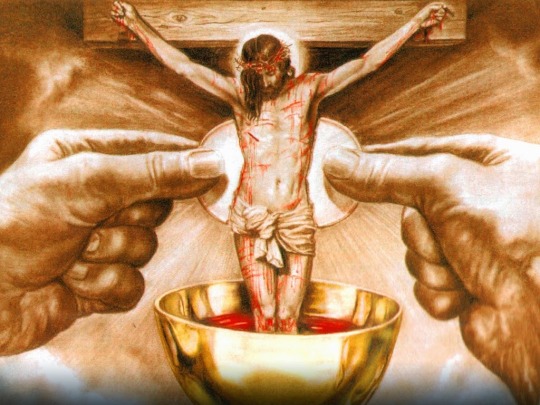
I love this one too…
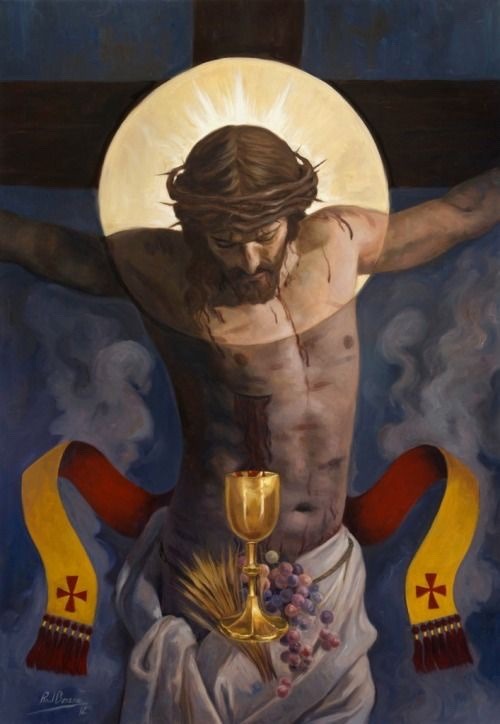
So when you eat the blessed Eucharist and drink the blessed wine done by a Catholic priest, you really do consume the substance that is Jesus’s body, blood, soul, and divinity. Ever hear that phrase, “you are what you eat”? When we consume Jesus, that doesn’t mean we are cannibals, become God, or re-sacrifice Jesus. It means we become a better reflection of Jesus.
Catholics believe in the Real Presence of Christ in the Eucharist because Jesus tells us this is true in the Bible: ““No one can come to me unless the Father who sent me draws them, and I will raise them up at the last day. It is written in the Prophets: ‘They will all be taught by God.’ Everyone who has heard the Father and learned from him comes to me. Very truly I tell you, the one who believes has eternal life. I am the bread of life. Your ancestors ate the manna in the wilderness, yet they died. But here is the bread that comes down from heaven, which anyone may eat and not die. I am the living bread that came down from heaven. Whoever eats this bread will live forever. This bread is my flesh, which I will give for the life of the world.” Then the Jews began to argue sharply among themselves, “How can this man give us his flesh to eat?” Jesus said to them, “Very truly I tell you, unless you eat the flesh of the Son of Man and drink his blood, you have no life in you. Whoever eats my flesh and drinks my blood has eternal life, and I will raise them up at the last day. For my flesh is real food and my blood is real drink. Whoever eats my flesh and drinks my blood remains in me, and I in them. Just as the living Father sent me and I live because of the Father, so the one who feeds on me will live because of me. This is the bread that came down from heaven. Your ancestors ate manna and died, but whoever feeds on this bread will live forever.” He said this while teaching in the synagogue in Capernaum. On hearing it, many of his disciples said, “This is a hard teaching. Who can accept it?” Aware that his disciples were grumbling about this, Jesus said to them, “Does this offend you? Then what if you see the Son of Man ascend to where he was before! The Spirit gives life; the flesh counts for nothing. The words I have spoken to you—they are full of the Spirit and life. Yet there are some of you who do not believe.” For Jesus had known from the beginning which of them did not believe and who would betray him. He went on to say, “This is why I told you that no one can come to me unless the Father has enabled them.” From this time many of his disciples turned back and no longer followed him.” John 6:44-66
Fun facts!!!:
Eucharist: “is a transliteration of the Greek word eucharistia, which is itself a translation of the Hebrew word berekah. All three words have the meaning of thanksgiving, or praise for the wonderful works of God.”
Bethlehem: the city where Jesus was born means “House of Bread”!
Transubstantiation: “the conversion of the substance of the Eucharistic elements into the body and blood of Christ at consecration, only the appearances of bread and wine still remaining.”
I saw a poll that only one third of Catholics really believe in Transubstantiation. If you decide in your journey to become part of the Catholic Church, please do not ever forget the words Jesus spoke about Himself to His people and those who read today. He truly is present as the Eucharist and wine.
Did you know there is evidence that the Eucharist is truly Jesus?! They are called Eucharistic Miracles. There are sooo many stories from around the world of bleeding Eucharists that scientists and such have actually tested in their labs to find real they had human blood down to a specific blood type AND material evidence of finding human heart tissue not healthy and strong but distressed! Blessed Carlo Acutis (a young man that passed away that is currently in the process of sainthood here on Earth) created an amazing website that collected examples of Eucharistic Miracles. (See link below.) This subject itself is just extra icing on the cake but don’t fall down the rabbit hole so you don’t feel overwhelmed.
youtube
Bishop Barron on the Real Presence of Christ in the Eucharist
youtube
Explaining the Faith - The Eucharist In Scripture
youtube
Explaining the Faith - Eucharistic Miracles: Scientific Proof
youtube
The Veil Removed, what really happens during a Catholic Mass
I could give you so much more but this was just so wonderful to be able to teach you. Know that it’s ok to feel overwhelmed. The topic of what the Eucharist really is and why it is so important is so rich in history and traditions. I hope I was able to satisfy your curiosity. If you ever have any more questions about it, I highly recommend reading sections about it in the Catechism of the Catholic Church (revised edition) but more importantly, reach out to a Catholic priest or bishop by calling them, e-mailing, or even dropping by in person. I am not part of the clergy at all, so talking to a Catholic priest or bishop, you will be able to answer any more questions you have to the Eucharist and they will explain it so well. If you are interested in wanting to know more about the Catholic Faith, I strongly suggest asking about the RCIA, free classes offered by your nearest Catholic Church which will allow you to explore what the Catholic Faith is and answer any questions you have. No pressure though, but just know we are here for you. I am so happy you were chosen as well by God! I will pray that you have a wonderful, exciting journey! God bless and you have a wonderful day/night as well.
78 notes
·
View notes
Text
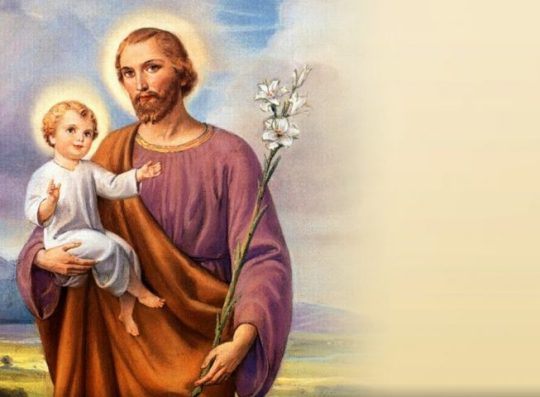
St. Joseph: Our Patron Saint of a Happy & Holy Death
Intriguing, hidden, and silent, St. Joseph’s role in salvific history has been analyzed and philosophized for millennia. Also known as Terror of Demons, Light of Patriarchs, and Mirror of Patience, St. Joseph remains a powerful intercessor for many. Often invoked by those desperate to find gainful employment or patrons who find it impossible to sell their homes, St. Joseph can be much more for us—a friend, a mentor.
His silence reminds us to listen more, to allow God to move in us instead of reacting impulsively, to quiet our emotions before offering a wise answer, and to walk humbly each day in our spiritual journey.
This humility, when we seek to imitate it as St. Joseph surely did, becomes a hallmark to a happy death. His exemplary virtue brings us back from confusion, discord, and the restlessness we often find ourselves wallowing in. Here are some ways we can invoke his prayers and guidance as we face the end of our days on earth.
St. Joseph Waited for God’s Guidance and Promptly Followed It
Consider the Flight to Egypt: Mary slept soundly next to St. Joseph, cradling the Infant Jesus in her arms. It was night, and silence enveloped them. Suddenly, St. Joseph was started awake by a dream, in which St. Gabriel announced an urgent message: “Take the child immediately to Egypt!”
It had been a long stretch of their sojourn to Bethlehem. The Holy Family knew during that time that they, even as pilgrims, could not rush God’s plan for them. So they waited for direction and never questioned the inopportune moment of quietly slipping away into the night.
When we ponder our mortality, we tend to bypass it out of fear. We can pray to St. Joseph to help us wait patiently through our earthly sufferings and to offer them back to God in reparation for our sins. This is the slow road to sanctity.
How hasty am I to find answers to my questions or prayers? How can St. Joseph help me to wait patiently for God’s perfect timing?
St. Joseph Was Devoted to Mary and Jesus.
Imitation of St. Joseph’s fidelity to Our Lady and Jesus is a sure path to Heaven for us. When our hearts are fixed on eternity, it is not difficult to imagine the end of our earthly existence. Those who are tormented terribly in their final days would do well to receive the consolation from saints and angels.
Our Lady has promised those who love her and are faithful to her Son will not be neglected at the hour of death. St. Joseph remained at their side and cared for them, even as he grew infirm and aged.
When we age, too, we might forget about Heaven, because pain distracts us from prayer and suffering with patience. Let us ask St. Joseph, then, to come to our aid as our bodies and minds begin to fail us, that we remain faithful to God.
In what ways can I ask St. Joseph to increase my devotion to the United Hearts of Jesus and Mary?
St. Joseph Was Patient, Meek, Prudent, and Pure
St. Joseph was patient – He never made decisions without clear direction from God. Even as God gave him signs in dreams and visions, he did not doubt God’s voice. Patience stems from a keen awareness of the presence of the Holy Spirit in and around us. Let us pay attention to the subtle cues from God every day.
St. Joseph was meek – He was receptive, sensitive, and vulnerable. Through these qualities, he exhibited emotional strength and spiritual stamina. We often equate meekness with weakness of spirit, but there is a reason it is mentioned in the Beatitudes. A heart that is closed to love is one that is not meek, but it takes radical trust to expose oneself entirely to the unknown.
St. Joseph was prudent – He took time to deliberate before making a decision that would affect not only his immediate family, but all of us! I wonder if he knew the weight of his authority, if he understood the implications of keeping Jesus safe so that He could save souls to the end of time?
St. Joseph was pure – This includes chastity and modesty, yes, but also purity of heart. Those who are pure of heart are unpretentious and empty of self. This allows room for the Holy Spirit to work in them. Emptiness of self is likely one of the most difficult poverties we will face as we age and face death, but St. Joseph can be the beacon to direct us Heavenward.
How can I model St. Joseph in patience, meekness, prudence, and purity?
Death can be terrifying, but it has the potential to be beautiful, too. It can leave us feeling unsettled, or we can be immersed in the peace that surpasses all human understanding. We have the power to choose how we will live today – for ourselves or for God? The road to a holy death is paved with countless crossroads and is covered in fog.
St. Joseph, Patron of a Happy Death, pray for us!
JEANNIE EWING
23 notes
·
View notes
Text
Devotional Hours Within the Bible

by J.R. Miller
The Wise Men Led by the Star (Matthew 2)
Matthew does not tell us much of the infancy of Jesus. There is something very beautiful, however, in the little we have in this first Gospel. It gives us a glimpse of the way the world, outside of His own country, received Him. There was no room for Him in the inn, and He was born in a stable; but Matthew shows the Far East waiting for Him and honoring Him. A little later, too, it shows Egypt sheltering Him. Jerusalem was the place where naturally the Messiah should have been first and most highly honored - but Jerusalem heard of the great event of His coming, from the Eastern Magi.
The coming of the wise men to the cradle of Jesus is an intensely interesting incident. The time was probably soon after the presentation in the temple. Paintings often wrongly represent the wise men and the shepherds together in the cave-stable, adoring the Christ-child. As the flight into Egypt came immediately after the visit of the wise men, and the Holy Child probably kept for many months away from the country, it is evident that their appearance was not at the beginning of the life of Jesus, and that they could not have been present with the shepherds.
Who the wise men were - we do not know with certainty. The historian speaks of the Magi as a priestly caste of the Medes. They were known as interpreters of dreams. They were also reputed to be observers of the heavens, students of the secret things of nature. Whatever the place of these Magi or wise men was, they were highly honored of God in this reception of Jesus Christ.
The birth of Jesus took place at Bethlehem. This was the most wonderful event of human history - the coming of the Son of God in human flesh into the world. Love was born that night. True, there was love in the world before. Mothers loved their children. Friend loved friend. Natural affection was common. But the love which we know as Christian love had its beginning in the birth of Jesus Christ. It is well for us to note, however, that the historical fact of Christ's birth, is not that which saves us. He must be born again in us.
The wise men came many hundreds of miles to find the newborn King. The journey was long, difficult, perilous, and very costly. If these men endured so much toil and danger in seeking Jesus - we should count no obstacle too great to overcome in our quest of Him. We should be ready to go thousands of miles, if need be, in seeking for Him. No search for Christ, however costly, will be without avail. He is the pearl of great price (see Matthew 13:46), and we shall be well paid for our search, though it costs us the sacrifice of all other things, and though we even have to lay down our life to find Him.
Surprisingly, this greatest event of history - made little stir in the world. A few humble shepherds came to look with wonder on the newborn Babe that lay in the young mother's arms - but that was all. The Jews had been looking for their Messiah - but did not recognize Him when He came. Their books foretold His coming; but when He came it was not known by His people that He had appeared. His advent was quiet. There was no blare of trumpets. Noise and show are not necessary accompaniments of true power. The mightiest energies in this world - are often the quietest. The grace of God always comes without observation. Angels minister noiselessly. The most useful Christians are not those who make the most ado at their work - but those who in humility and simplicity, unconscious of any splendor shining in their faces, go daily about their work for their Master.
For another thing, we do not always know when Christ actually comes to us. He had been born many months, had been welcomed by angels, had been presented in the temple and received with joy there; but Jerusalem had not known that He was there. He was in the world, and the world was made by Him - but the world knew Him not. We speak severely of the treatment accorded to Him by His own people, who were so indifferent to the coming of their Messiah. Yet, why should we complain so of the Jews? Our King is in our midst these very days - do we recognize Him?
We cannot understand just how the wise men were led to Palestine. They said they saw a star in the east, the star of the newborn King, and were led by it. There had been a great deal of speculation as to the nature of the star, whether it was a natural or supernatural appearance. But it does not matter; whatever it was - it led these men unmistakably to the feet of the Christ. Even the faintest glimmerings of spiritual light should be welcomed by us and their guidance accepted. We should not wait to know all about Christ, and to see Him in all His glory - before we set out to seek Him. We should follow the first faint gleams, and then, as we go on - the light will become brighter and we shall see more and more of Him, see Him more and more clearly, until at length we behold Him in all His blessed beauty, face to face. Certainly there is no one in Christian lands in these days that does not have a great deal more light to guide him to the Christ, than these wise men had.
The Herods have an unenviable record in New Testament history. Their hands are stained with crime. When this Herod, Herod the Great, heard the inquiries of the wise men, he was much troubled. He thought that he himself was king of the Jews, and it terrified him to hear of another King of the Jews, whom these strangers from the East had come so far to see. Hearing of Christ does not always bring joy. It brought gladness to the humble shepherds and to the wise men - but to Herod it brought great distress. His name makes bad men think of their sins - and then of the judgment. It is only when we love Christ and want to have Him for our friend - that the thought of Him is sweet and pleasant. "Unto you therefore who believe - He is precious!" Those whose faith is fixed upon Him are never terrified by thoughts of Him. There is nothing to fear - but everything to give joy and confidence to those whose trust is in Him.
Herod, himself unable to answer the question of the wise men, turned to the scribes. The wise men wanted to know where they could find the King who had been born in Judea. "We have seen His star," they said. Whatever it was that led them, we know that there was no illusion, and they were not deceived. They had been led, and they had come to the right place.
Herod could not answer their question - but he could easily learn what the Jewish books said about where the Christ would be born, so he called the priests and scribes and asked them where their Messiah should be born. It did not take them long to give the answer. They knew their Bible well. They could even give chapter and verse, and could tell the name of the town in which the Messiah was to be born. These facts were all down in their books.
Yet we do not see that they had made any use of their knowledge. They could tell the wise men where the Christ was to be born - but they had not themselves taken one step toward Bethlehem to seek for Him, nor did they become eager to see their King, when they were so close to Him. We must be careful not to repeat the mistake of these ancient teachers. Most of us know our Bible fairly well, and can tell others glibly enough where and how to find the Christ. But have we gone to the place where He is, to search for Him and to worship Him?
The scene when the wise men found the Child-king, was very beautiful. They were very glad. They saw now the child-king they had journeyed so far to find. They did not doubt for a moment that this was the object of their quest. When they saw Him, they fell down and worshiped Him. They saw only a baby lying in a young mother's arms. There was no crown on His head. No glory gleamed from His face. His surroundings were most unkingly, without pomp or brilliance. The child did nothing before them to show His royalty - spoke no word, wrought no kingly act of power. Yet the wise men believed and worshiped Him. Think of how much more we know about the Christ, than they did. We see Him in all his glory of His life, death, resurrection, and ascension. We see Him sitting at the right hand of God as King of kings, wearing many crowns. It is easy for us to find kingly marks in Him. Shall we be behind the wise men in our adoration?
The wise men did more than adore - they opened their treasures and offered the gifts of gold, frankincense, and myrrh, which they had brought all the way from their own home. The sincerity of their worship was thus attested, by the costliness of their gifts. The treasures they had brought were of great value - the most costly things they could find, the best they had to give. It is not enough to sing praise to Christ and give Him an homage that costs nothing. He asks for our gifts the offerings of our love, our service, the consecration of our lives. We need to guard against the worship that is only mere sentiment. Love that will not give and sacrifice, is neither deep or true. Giving is the test of loving. The measure of our love is what we are willing to give and sacrifice. Some people sing missionary hymns with great zest, and when the collection plate is passed - they have nothing for it. The wise men not only gave gifts - but gifts that were rich and costly. Some people give - but with such a pitiful attitude that it must pain the Master to receive their offerings. These Magi gave with gladness.
There are many ways of laying our offerings at the feet of Jesus Christ. He Himself does not need our money - but His cause needs it. The extension of His Kingdom in this world, at home and abroad, requires money; and this must be brought by His followers. Those who have no interest in the saving of others, in the sending of the gospel to those who have it not - have not themselves really tasted the love of Christ. Then we may give to Christ also in ministering to His needy ones. The latter part of the twenty-fifth chapter of Matthew reveals to us this wonderful truth that those who serve the needy, the suffering, the troubled, in Christ's name - are serving Him.
5 notes
·
View notes
Audio
THE PAST, PRESENT AND FUTURE OF WILL BUTLER
It’s been nearly four centuries since the first member of the Butler family arrived in the United States. From Quakerism and Mormonism to getting thrown in jail, the Butler family history is a fascinating story which bears one constant, one recurring theme on which the Butler’s always touch base: music. On new solo album Generations, Will Butler (Arcade Fire) expands his horizons while delving into his own legacy and asking questions about his place in society as an American. Jack Parker called up Butler to discuss his namesake’s glistening legacy, the new album and societal parallels between 2020 and 1820.
Hi Will. Generations is your second studio album, and it comes five years after your debut, Policy. Was it always a long term plan, in your mind, to put out a second album?
Yeah. I was always going to do a second record, but my wife and I have an eight year old and two twins. Not to blame the twins, but I would have made a second record earlier, haha. There was also the last Arcade Fire record, and I went to grad school. It’s been busy.
You described this album as more of a novel. Would you call it a concept album?
I don’t think of it as a concept album, but any listener or critic is welcome to interpret in whichever way they like. There is a sonic arc to the album, and although it’s not exactly character development there is some sort of development throughout the record. I feel like it takes on a journey.
The stories on some tracks are definitely vivid in places. What informed your songwriting on some of these songs? Fine tells a very poignant story.
Some of the songs on the album have a big focus on 19th century American poets like Emily Dickinson or Erwin Melville. Melville isn’t famous for his poetry, but he has some good poems about the Civil War. I was reading a lot of history, and a lot of the themes are essentially just trying to absorb what the fuck has been happening the last 200 years.
And of course everything that’s been happening the last six months. Do you notice many similarities between the last half year versus the last 200 years?
Yeah. We had Ferguson and Baltimore, and people are protesting now too. People are rioting! But this isn’t an outlier in American history; the police keep brutalising people and those being brutalised keep saying that enough is enough. It happens every few years, so it’s a very consistent part of history. It’s shocking that people even need to come out and say that black lives matter. That is an outlier, the fact that we have to highlight that killing black people is a bad thing. It’s never exactly the same throughout history, but it’s certainly familiar in a dark way. The pandemic…eugh. There aren’t many global pandemics which I’ve experienced in my lifetime, but it’s certainly not what I expected.
The sonic palette of Generations is much broader. There seems to be more emphasis on exploring different sounds and styles; was this a conscious decision or something that just came naturally?
I wanted Generations to be a more complex and complicated album with more development. My brain is so broken that I think about food a lot; Policy was more a case of making dinner with whatever you can find in the fresh section at the supermarket. Generations is more purposeful, it’s layering the flavours, roasting the meat for 48 hours and stewing the bones. There’s more foraging.
I guess solo projects like this one also allow you to explore territory you wouldn’t go for as quickly with Arcade Fire.
Yeah. I mean, they’re still related projects in that I’m the same human being poking at the same stuff sonically and emotionally, but with this I can go further in certain directions. This album is still collaborative, but I can also do more.
You previously said that this record asks the question “what’s my place in American history?” Assuming you know that now: what is your place in American history, as a rich, white male?
It’s a positional answer, to be honest. It’s how you are positioned in a community and how you relate to the people you live with. It’s hard to answer, because it’s also in conversation with New York City and Brooklyn. Like, how is New York going to move forward? On a broader level, though, it’s still provisional and conversational.
So has working on this record helped you discover aspects of yourself which you weren’t aware of?
I’m real smart on a booksmart level, but working on this record made me realise how dumb you still are as a human, on a human level. Most of us are pretty dumb, and every now and then you encounter some amazing humans, but then you’re like, “wow, I’m real dumb and I’m lost without these people”.
I just want to touch on the album closer, Fine. What informed your songwriting and the story on that track in particular? It’s one of your best works to date.
Thank you. So, the first Butler came to the US in the 1630s and settled into Boston before moving to Cape Cod and living on the water. They were one of the first families to convert to Quakerism. It’s in the history records because they kept getting fined for being Quakers. They’d get thrown into jail and cops would arrest Daniel Butler in the middle of the night for exposing little kids to Quakerism. The Butlers have lived in New England on a long stretch of coastline for the last 400 years. My Mum’s family is Mormon, and my great grandfather was the last son of a Mormon homesetter who crossed the plains. He was born in the 1870s and he was a musician. He started a family band with his kids and they would drive across the desert – before there were even roads – on wooden planks to play shows in churches and then get arrested for doing it. My life today is very beautifully influenced by what happened at the end of the 19th century. It’s so beautiful to inherit such a musical legacy, but there’s also such a horrifying legacy to being an American. Why I am how I am is informed by a lot of beauty and horror. It’s about trying to figure out where you stand before you throw your first punch. You have to square your hips. It’s not so much an exercise in guilt as it is in knowledge.
Fine is trying out the Kanye West trick of being really stupid and profound by talking about important and unimportant things are the same time. I was thinking about George Washington from 250 years ago, just thinking about his legacy and on a wider scale the legacies which we inherit. How those legacies came to us, and how the world was made. It’s trying to do that both in a jokey and a horrifying way. Look at Washington’s slaves, for example. He has one named Henry Washington who I’d never heard of until I was an adult. He escaped and with the British against the United States, and then lost. In order to avoid slavery he fled to Canada and then ended up in Sierra Leone, where he ended up fighting against the British. These are incredible histories which just go ignored. Fine is essentially about trying to figure out what line of history we’re following and how we follow it.
Now more than ever people are turning to the arts for empowerment. How can we use music in 2020 to harness positive change?
Music has been a great comfort to people who are doing really intense work, and I’ve seen people really respond to artists who say something meaningful. Art can really provide comfort, which I think is important. I get that there are other important angles, like how art isn’t always supposed to be comfortable, but over the years I’ve seen how much value music has for people who are trying to make the world a better place. As a musician you can’t control the people who feel comfort. You can’t tell someone horrible that they aren’t supposed to feel comforted by your music, but you can pray that your music is put in front of someone who will nourish it.
Of course. So with live music still out of the question, what’s next for you?
I’m really excited for the record to come out! People have been finding meaning in comfort through music these last six months, and it kind of feels like you’re doing a service by putting music out into the world. I’ll probably do some kind of online thing, but it’s not really my speciality. I’ve got a week and a half to figure it out. My son started school today in New York, so figuring out online school for an eight year old is also a thing. And if it weren’t for the pandemic, I’d have gotten into my car and driven around Pennsylvania knocking on doors ahead of the election in November.
27 notes
·
View notes
Note
so i recognize that this is. a lot. but,,,, 6, 8, 14, 22, 25, 28, 33, 35, 37, 50, 55, 60, 63, 66, 69, 77, 86, 91, 104, and 122? :)
0_0
Oh thank you, this is a gift
Okay, here we go!
6 (a book with a pink cover) : I'm gonna cheat a bit because only part of the cover is pink but Wild Beauty by Anna Marie McLemore is one of my FAVORITE books, so I don't mind bending the rules. Five bisexual latina cousins all crushing on the same girl, magical realism, and a very good application of social messaging to the themes. I won't say more than that, but really go give it a look!! also my copy is signed Viva México by the author so that makes me love it more
8 (a book you finished in one sitting) : Okay, a couple years ago when Tiamat's Wrath by James S. A. Corey (book 8 of the Expanse series) came out, I started reading it at breakfast in the dining hall, continued during basically all of my classes, and then finished it sometime around 10 or 11 that night (I think). For reference, a quick google tells me that book is about 166,500 words. And I loved EVERY minute of it!
14 (a book that made you trip on literary acid) : Okay, that has definitely got to be Harrow the Ninth by Tamsyn Muir. Just. All Of It. God, she does some really fantastic things with narrative mechanics in that book, plus just the sheer brilliance of the plot and the mountain of questions and theories I had once I finished it. Also the memes. The memes made me trip literary acid.
22 (your favorite thriller) : Okay, I think I've literally only read one thriller (if it counts, I'm not sure), but The Ninth House by Leigh Bardugo. I'm cheating since it's still fantasy, but I had a limited pool of options.
25 (a book by your favorite author) : Okay, so I tend to like books or series more than author's specifically easier to like a work of fiction than a person but I'm gonna go with The Hobbit by J.R.R Tolkien. I grew up reading his books and I've definitely taken a lot from his writing for my own style, and I still love the Hobbit.
28 (a book you wish you could read as a beginner again) : Oooh this is a really interesting one. I think I'd say Museum of Thieves by Lian Tanner. I can’t remember when I first read it but it’s a middle grade story all about defying authority and escaping corrupt systems. I really need to reread it at some point.
33 (a book with a white cover) : The Weight of Feathers by Anna Marie McLemore! (can you tell I like their writing?). Star crossed lovers of two performing families with magical realism threaded through the narrative! Really fun read and I always appreciate latine characters. There's also Roma representation as well!
35 (a book featuring the found family trope) : I'm gonna attempt to not read any well beaten paths, so I'll say Caliban's War by James S. A. Corey, the second book of the Expanse series (okay that's technically a well beaten path, sue me). A lot of the book is the main characters figuring out their group dynamic and challenging each other to be better and it's just so goooooood!
37 (your favorite heist book) : I mean, what else could I put here? Crooked Kingdom by Leigh Bardugo, hands down. Narrowly beats out Six of Crows, only because it has more cons, more emotions, and also Nikolai Lantsov. I'll never get tired of that book.
50 (a book that made you cry a lot) : oh boy, I could say Crooked Kingdom again, that’d be true. But instead I’ll say Persepolis Rising by James S.A. Corey (I read a lot of series, sue me. Also that series is gonna be 9 books long by the end, there’s a lot of material). Anyway I won’t say why I cried, it’s a spoiler, but oh man. I weeped.
55 (a book with a satisfying ending) : The Empire of Gold by S.A. Chakraborty! I really liked how it ended, it placed a lot of focus on the platonic relationships, it left a lot of plot open ended so it felt like the world was still alive, and it showed the main character as being in a position of power while still retaining the subversive and roguish qualities from the start of the series that I loved.
60 (a book that you think about at 3am) : The Empire of Bones by N.D. Wilson. This is the 3rd book in my favorite series, the Ashtown burials and just….. wow there is so much. It has so much depth to it while still being about a 13 year old standing up to a cadre of ancient death and pain gods. It has one of the most beautiful monologues I’ve ever read and that shaped my understanding of compassion and heroism. It has an orange mohakwed Irish monk.
63 (a book that actually made you laugh out loud) : I knew it would make it on the list somewhere but GIDEON THE NINTH BY TAMSYN MUIR. God this book was funny! I won’t spoil any of the jokes, but Gideon is a sarcastic little shit and I love all of her banter with Harrow and the rest of the characters get plenty of cracks in as well.
66 (a book that fucked you up) : oh boy The Lies of Locke Lamora by Scott Lynch. This book had some visceral shit in it. Like, not exactly in a bad way, its not a game of thrones situation, but stuff that made my fucking skin crawl. Very good book, I heartily recommend.
69 (your favorite mythological retelling) : I’m gonna go with Odd and the Frost Giants by Neil Gaiman. I first listened to it in audiobook form while on a road trip through the southwest and I really like coming back to it. Sort of reworks the original myth it borrows from, but in a really delightful and fun way.
77 (a book so useless you could use it as a coaster) : ATLAS SHRUGGED BY AYN RAND. Alright, I’ll be honest, I have not yet read this book. I probably will someday just to see how bad it really is. But from what I know about it I would rather get drop kicked off a roof than read that pile of self important, self centered ego circle jerking. In conclusion, I don’t like it.
86 (a book with an insane plot twist) : Okay a bunch of the really insane plot twisty ones I’ve already mentioned and I don’t want to do repeats, so I’m gonna bend the rules and say The Silent Bells by N.D. Wilson, fourth book of the Ashtown Burials series, a book that is not technically finished yet, it is being released serially in this really cool faux newspaper format. The plot twist is that this story ever got off the ground, because due to legal and publisher shenanigans the author wasn’t able to publish the book until 7 or 8 years after the last book came out. But he did! And I’m very happy!
91 (the shortest book you've read) : That would probably be Signs Preceding the End of the World by Yuri Herrera, translated by Lisa Dillman. It’s a really good book I read for an English class about a girl who crosses the US/Mexico border in search of her brother. It’s got a really interesting narrative style that I wasn’t used to and a really cool thematic structure related to the nahuatl journey to the underworld.
104 (a fluffy sweet read) : oh man, that’s tough, I don’t read a lot of fluffy things, even tho it’s what I prefer in my romances. Yeah, the closest I can get is Wild Beauty by Anna Marie McLemore again. (See the first question answered)
122 (your favorite winter read) : Hmmm I don’t necessarily have seasonal reads, but I’ll go with an old family classic The Christmas Mystery, which is about a boy who finds an advent calendar with little scraps of paper behind each door, telling the story of a little girl who in the process of chasing a lamb runs away to Bethlehem (and back in time) to the birth of Jesus, meeting angels and Shepards and other biblical figures. It’s a really sweet story and my family used to read each chapter every day of advent until Christmas Eve.
#COMPLETE#ho.ly.shit.#Jack thank you for that book workout#SNORT#that was an entire bookshelf#books#hope you like it!#long post
5 notes
·
View notes
Text
Patris Corde - Apostolic Letter of Pope Francis
https://www.vatican.va/content/francesco/en/apost_letters/documents/papa-francesco-lettera-ap_20201208_patris-corde.html
APOSTOLIC LETTER - PATRIS CORDE
OF THE HOLY FATHER, FRANCIS
ON THE 150th ANNIVERSARY
OF THE PROCLAMATION OF SAINT JOSEPH
AS PATRON OF THE UNIVERSAL CHURCH
WITH A FATHER’S HEART: that is how Joseph loved Jesus, whom all four Gospels refer to as “the son of Joseph”.[1]
Matthew and Luke, the two Evangelists who speak most of Joseph, tell us very little, yet enough for us to appreciate what sort of father he was, and the mission entrusted to him by God’s providence.
We know that Joseph was a lowly carpenter (cf. Mt 13:55), betrothed to Mary (cf. Mt 1:18; Lk 1:27). He was a “just man” (Mt 1:19), ever ready to carry out God’s will as revealed to him in the Law (cf. Lk 2:22.27.39) and through four dreams (cf. Mt 1:20; 2:13.19.22). After a long and tiring journey from Nazareth to Bethlehem, he beheld the birth of the Messiah in a stable, since “there was no place for them” elsewhere (cf. Lk 2:7). He witnessed the adoration of the shepherds (cf. Lk 2:8-20) and the Magi (cf. Mt 2:1-12), who represented respectively the people of Israel and the pagan peoples.
Joseph had the courage to become the legal father of Jesus, to whom he gave the name revealed by the angel: “You shall call his name Jesus, for he will save his people from their sins” (Mt 1:21). As we know, for ancient peoples, to give a name to a person or to a thing, as Adam did in the account in the Book of Genesis (cf. 2:19-20), was to establish a relationship.
In the Temple, forty days after Jesus’ birth, Joseph and Mary offered their child to the Lord and listened with amazement to Simeon’s prophecy concerning Jesus and his Mother (cf. Lk 2:22-35). To protect Jesus from Herod, Joseph dwelt as a foreigner in Egypt (cf. Mt 2:13-18). After returning to his own country, he led a hidden life in the tiny and obscure village of Nazareth in Galilee, far from Bethlehem, his ancestral town, and from Jerusalem and the Temple. Of Nazareth it was said, “No prophet is to rise” (cf. Jn 7:52) and indeed, “Can anything good come out of Nazareth?” (cf. Jn 1:46). When, during a pilgrimage to Jerusalem, Joseph and Mary lost track of the twelve-year-old Jesus, they anxiously sought him out and they found him in the Temple, in discussion with the doctors of the Law (cf. Lk 2:41-50).
After Mary, the Mother of God, no saint is mentioned more frequently in the papal magisterium than Joseph, her spouse. My Predecessors reflected on the message contained in the limited information handed down by the Gospels in order to appreciate more fully his central role in the history of salvation. Blessed Pius IX declared him “Patron of the Catholic Church”,[2] Venerable Pius XII proposed him as “Patron of Workers”[3] and Saint John Paul II as “Guardian of the Redeemer”.[4] Saint Joseph is universally invoked as the “patron of a happy death”.[5]
Now, one hundred and fifty years after his proclamation as Patron of the Catholic Church by Blessed Pius IX (8 December 1870), I would like to share some personal reflections on this extraordinary figure, so close to our own human experience. For, as Jesus says, “out of the abundance of the heart the mouth speaks” (Mt 12:34). My desire to do so increased during these months of pandemic, when we experienced, amid the crisis, how “our lives are woven together and sustained by ordinary people, people often overlooked. People who do not appear in newspaper and magazine headlines, or on the latest television show, yet in these very days are surely shaping the decisive events of our history. Doctors, nurses, storekeepers and supermarket workers, cleaning personnel, caregivers, transport workers, men and women working to provide essential services and public safety, volunteers, priests, men and women religious, and so very many others. They understood that no one is saved alone… How many people daily exercise patience and offer hope, taking care to spread not panic, but shared responsibility. How many fathers, mothers, grandparents and teachers are showing our children, in small everyday ways, how to accept and deal with a crisis by adjusting their routines, looking ahead and encouraging the practice of prayer. How many are praying, making sacrifices and interceding for the good of all”.[6] Each of us can discover in Joseph – the man who goes unnoticed, a daily, discreet and hidden presence – an intercessor, a support and a guide in times of trouble. Saint Joseph reminds us that those who appear hidden or in the shadows can play an incomparable role in the history of salvation. A word of recognition and of gratitude is due to them all.
1. A beloved father
The greatness of Saint Joseph is that he was the spouse of Mary and the father of Jesus. In this way, he placed himself, in the words of Saint John Chrysostom, “at the service of the entire plan of salvation”.[7]
Saint Paul VI pointed out that Joseph concretely expressed his fatherhood “by making his life a sacrificial service to the mystery of the incarnation and its redemptive purpose. He employed his legal authority over the Holy Family to devote himself completely to them in his life and work. He turned his human vocation to domestic love into a superhuman oblation of himself, his heart and all his abilities, a love placed at the service of the Messiah who was growing to maturity in his home”.[8]
Thanks to his role in salvation history, Saint Joseph has always been venerated as a father by the Christian people. This is shown by the countless churches dedicated to him worldwide, the numerous religious Institutes, Confraternities and ecclesial groups inspired by his spirituality and bearing his name, and the many traditional expressions of piety in his honour. Innumerable holy men and women were passionately devoted to him. Among them was Teresa of Avila, who chose him as her advocate and intercessor, had frequent recourse to him and received whatever graces she asked of him. Encouraged by her own experience, Teresa persuaded others to cultivate devotion to Joseph.[9]
Every prayer book contains prayers to Saint Joseph. Special prayers are offered to him each Wednesday and especially during the month of March, which is traditionally dedicated to him.[10]
Popular trust in Saint Joseph is seen in the expression “Go to Joseph”, which evokes the famine in Egypt, when the Egyptians begged Pharaoh for bread. He in turn replied: “Go to Joseph; what he says to you, do” (Gen 41:55). Pharaoh was referring to Joseph the son of Jacob, who was sold into slavery because of the jealousy of his brothers (cf. Gen 37:11-28) and who – according to the biblical account – subsequently became viceroy of Egypt (cf. Gen 41:41-44).
As a descendant of David (cf. Mt 1:16-20), from whose stock Jesus was to spring according to the promise made to David by the prophet Nathan (cf. 2 Sam 7), and as the spouse of Mary of Nazareth, Saint Joseph stands at the crossroads between the Old and New Testaments.
2. A tender and loving father
Joseph saw Jesus grow daily “in wisdom and in years and in divine and human favour” (Lk 2:52). As the Lord had done with Israel, so Joseph did with Jesus: he taught him to walk, taking him by the hand; he was for him like a father who raises an infant to his cheeks, bending down to him and feeding him (cf. Hos 11:3-4).
In Joseph, Jesus saw the tender love of God: “As a father has compassion for his children, so the Lord has compassion for those who fear him” (Ps 103:13).
In the synagogue, during the praying of the Psalms, Joseph would surely have heard again and again that the God of Israel is a God of tender love,[11] who is good to all, whose “compassion is over all that he has made” (Ps 145:9).
The history of salvation is worked out “in hope against hope” (Rom 4:18), through our weaknesses. All too often, we think that God works only through our better parts, yet most of his plans are realized in and despite our frailty. Thus Saint Paul could say: “To keep me from being too elated, a thorn was given me in the flesh, a messenger of Satan to torment me, to keep me from being too elated. Three times I appealed to the Lord about this, that it would leave me, but he said to me: ‘My grace is sufficient for you, for power is made perfect in weakness’” (2 Cor 12:7-9).
Since this is part of the entire economy of salvation, we must learn to look upon our weaknesses with tender mercy.[12]
The evil one makes us see and condemn our frailty, whereas the Spirit brings it to light with tender love. Tenderness is the best way to touch the frailty within us. Pointing fingers and judging others are frequently signs of an inability to accept our own weaknesses, our own frailty. Only tender love will save us from the snares of the accuser (cf. Rev 12:10). That is why it is so important to encounter God’s mercy, especially in the Sacrament of Reconciliation, where we experience his truth and tenderness. Paradoxically, the evil one can also speak the truth to us, yet he does so only to condemn us. We know that God’s truth does not condemn, but instead welcomes, embraces, sustains and forgives us. That truth always presents itself to us like the merciful father in Jesus’ parable (cf. Lk 15:11-32). It comes out to meet us, restores our dignity, sets us back on our feet and rejoices for us, for, as the father says: “This my son was dead and is alive again; he was lost and is found” (v. 24).
Even through Joseph’s fears, God’s will, his history and his plan were at work. Joseph, then, teaches us that faith in God includes believing that he can work even through our fears, our frailties and our weaknesses. He also teaches us that amid the tempests of life, we must never be afraid to let the Lord steer our course. At times, we want to be in complete control, yet God always sees the bigger picture.
3. An obedient father
As he had done with Mary, God revealed his saving plan to Joseph. He did so by using dreams, which in the Bible and among all ancient peoples, were considered a way for him to make his will known.[13]
Joseph was deeply troubled by Mary’s mysterious pregnancy. He did not want to “expose her to public disgrace”,[14] so he decided to “dismiss her quietly” (Mt 1:19).
In the first dream, an angel helps him resolve his grave dilemma: “Do not be afraid to take Mary as your wife, for the child conceived in her is from the Holy Spirit. She will bear a son, and you are to name him Jesus, for he will save his people from their sins” (Mt 1:20-21). Joseph’s response was immediate: “When Joseph awoke from sleep, he did as the angel of the Lord commanded him” (Mt 1:24). Obedience made it possible for him to surmount his difficulties and spare Mary.
In the second dream, the angel tells Joseph: “Get up, take the child and his mother, and flee to Egypt, and remain there until I tell you; for Herod is about to search for the child, to destroy him” (Mt 2:13). Joseph did not hesitate to obey, regardless of the hardship involved: “He got up, took the child and his mother by night, and went to Egypt, and remained there until the death of Herod” (Mt 2:14-15).
In Egypt, Joseph awaited with patient trust the angel’s notice that he could safely return home. In a third dream, the angel told him that those who sought to kill the child were dead and ordered him to rise, take the child and his mother, and return to the land of Israel (cf. Mt 2:19-20). Once again, Joseph promptly obeyed. “He got up, took the child and his mother, and went to the land of Israel” (Mt 2:21).
During the return journey, “when Joseph heard that Archelaus was ruling over Judea in place of his father Herod, he was afraid to go there. After being warned in a dream” – now for the fourth time – “he went away to the district of Galilee. There he made his home in a town called Nazareth” (Mt 2:22-23).
The evangelist Luke, for his part, tells us that Joseph undertook the long and difficult journey from Nazareth to Bethlehem to be registered in his family’s town of origin in the census of the Emperor Caesar Augustus. There Jesus was born (cf. Lk 2:7) and his birth, like that of every other child, was recorded in the registry of the Empire. Saint Luke is especially concerned to tell us that Jesus’ parents observed all the prescriptions of the Law: the rites of the circumcision of Jesus, the purification of Mary after childbirth, the offering of the firstborn to God (cf. 2:21-24).[15]
In every situation, Joseph declared his own “fiat”, like those of Mary at the Annunciation and Jesus in the Garden of Gethsemane.
In his role as the head of a family, Joseph taught Jesus to be obedient to his parents (cf. Lk 2:51), in accordance with God’s command (cf. Ex 20:12).
During the hidden years in Nazareth, Jesus learned at the school of Joseph to do the will of the Father. That will was to be his daily food (cf. Jn 4:34). Even at the most difficult moment of his life, in Gethsemane, Jesus chose to do the Father’s will rather than his own,[16] becoming “obedient unto death, even death on a cross” (Phil 2:8). The author of the Letter to the Hebrews thus concludes that Jesus “learned obedience through what he suffered” (5:8).
All this makes it clear that “Saint Joseph was called by God to serve the person and mission of Jesus directly through the exercise of his fatherhood” and that in this way, “he cooperated in the fullness of time in the great mystery of salvation and is truly a minister of salvation.”[17]
4. An accepting father
Joseph accepted Mary unconditionally. He trusted in the angel’s words. “The nobility of Joseph’s heart is such that what he learned from the law he made dependent on charity. Today, in our world where psychological, verbal and physical violence towards women is so evident, Joseph appears as the figure of a respectful and sensitive man. Even though he does not understand the bigger picture, he makes a decision to protect Mary’s good name, her dignity and her life. In his hesitation about how best to act, God helped him by enlightening his judgment”.[18]
Often in life, things happen whose meaning we do not understand. Our first reaction is frequently one of disappointment and rebellion. Joseph set aside his own ideas in order to accept the course of events and, mysterious as they seemed, to embrace them, take responsibility for them and make them part of his own history. Unless we are reconciled with our own history, we will be unable to take a single step forward, for we will always remain hostage to our expectations and the disappointments that follow.
The spiritual path that Joseph traces for us is not one that explains, but accepts. Only as a result of this acceptance, this reconciliation, can we begin to glimpse a broader history, a deeper meaning. We can almost hear an echo of the impassioned reply of Job to his wife, who had urged him to rebel against the evil he endured: “Shall we receive the good at the hand of God, and not receive the bad?” (Job 2:10).
Joseph is certainly not passively resigned, but courageously and firmly proactive. In our own lives, acceptance and welcome can be an expression of the Holy Spirit’s gift of fortitude. Only the Lord can give us the strength needed to accept life as it is, with all its contradictions, frustrations and disappointments.
Jesus’ appearance in our midst is a gift from the Father, which makes it possible for each of us to be reconciled to the flesh of our own history, even when we fail to understand it completely.
Just as God told Joseph: “Son of David, do not be afraid!” (Mt 1:20), so he seems to tell us: “Do not be afraid!” We need to set aside all anger and disappointment, and to embrace the way things are, even when they do not turn out as we wish. Not with mere resignation but with hope and courage. In this way, we become open to a deeper meaning. Our lives can be miraculously reborn if we find the courage to live them in accordance with the Gospel. It does not matter if everything seems to have gone wrong or some things can no longer be fixed. God can make flowers spring up from stony ground. Even if our heart condemns us, “God is greater than our hearts, and he knows everything” (1 Jn 3:20).
Here, once again, we encounter that Christian realism which rejects nothing that exists. Reality, in its mysterious and irreducible complexity, is the bearer of existential meaning, with all its lights and shadows. Thus, the Apostle Paul can say: “We know that all things work together for good, for those who love God” (Rom 8:28). To which Saint Augustine adds, “even that which is called evil (etiam illud quod malum dicitur)”.[19] In this greater perspective, faith gives meaning to every event, however happy or sad.
Nor should we ever think that believing means finding facile and comforting solutions. The faith Christ taught us is what we see in Saint Joseph. He did not look for shortcuts, but confronted reality with open eyes and accepted personal responsibility for it.
Joseph’s attitude encourages us to accept and welcome others as they are, without exception, and to show special concern for the weak, for God chooses what is weak (cf. 1 Cor 1:27). He is the “Father of orphans and protector of widows” (Ps 68:6), who commands us to love the stranger in our midst.[20] I like to think that it was from Saint Joseph that Jesus drew inspiration for the parable of the prodigal son and the merciful father (cf. Lk 15:11-32).
5. A creatively courageous father
If the first stage of all true interior healing is to accept our personal history and embrace even the things in life that we did not choose, we must now add another important element: creative courage. This emerges especially in the way we deal with difficulties. In the face of difficulty, we can either give up and walk away, or somehow engage with it. At times, difficulties bring out resources we did not even think we had.
As we read the infancy narratives, we may often wonder why God did not act in a more direct and clear way. Yet God acts through events and people. Joseph was the man chosen by God to guide the beginnings of the history of redemption. He was the true “miracle” by which God saves the child and his mother. God acted by trusting in Joseph’s creative courage. Arriving in Bethlehem and finding no lodging where Mary could give birth, Joseph took a stable and, as best he could, turned it into a welcoming home for the Son of God come into the world (cf. Lk 2:6-7). Faced with imminent danger from Herod, who wanted to kill the child, Joseph was warned once again in a dream to protect the child, and rose in the middle of the night to prepare the flight into Egypt (cf. Mt 2:13-14).
A superficial reading of these stories can often give the impression that the world is at the mercy of the strong and mighty, but the “good news” of the Gospel consists in showing that, for all the arrogance and violence of worldly powers, God always finds a way to carry out his saving plan. So too, our lives may at times seem to be at the mercy of the powerful, but the Gospel shows us what counts. God always finds a way to save us, provided we show the same creative courage as the carpenter of Nazareth, who was able to turn a problem into a possibility by trusting always in divine providence.
If at times God seems not to help us, surely this does not mean that we have been abandoned, but instead are being trusted to plan, to be creative, and to find solutions ourselves.
That kind of creative courage was shown by the friends of the paralytic, who lowered him from the roof in order to bring him to Jesus (cf. Lk 5:17-26). Difficulties did not stand in the way of those friends’ boldness and persistence. They were convinced that Jesus could heal the man, and “finding no way to bring him in because of the crowd, they went up on the roof and let him down with his bed through the tiles into the middle of the crowd in front of Jesus. When he saw their faith, he said, ‘Friend, your sins are forgiven you’” (vv. 19-20). Jesus recognized the creative faith with which they sought to bring their sick friend to him.
The Gospel does not tell us how long Mary, Joseph and the child remained in Egypt. Yet they certainly needed to eat, to find a home and employment. It does not take much imagination to fill in those details. The Holy Family had to face concrete problems like every other family, like so many of our migrant brothers and sisters who, today too, risk their lives to escape misfortune and hunger. In this regard, I consider Saint Joseph the special patron of all those forced to leave their native lands because of war, hatred, persecution and poverty.
At the end of every account in which Joseph plays a role, the Gospel tells us that he gets up, takes the child and his mother, and does what God commanded him (cf. Mt 1:24; 2:14.21). Indeed, Jesus and Mary his Mother are the most precious treasure of our faith.[21]
In the divine plan of salvation, the Son is inseparable from his Mother, from Mary, who “advanced in her pilgrimage of faith, and faithfully persevered in her union with her Son until she stood at the cross”.[22]
We should always consider whether we ourselves are protecting Jesus and Mary, for they are also mysteriously entrusted to our own responsibility, care and safekeeping. The Son of the Almighty came into our world in a state of great vulnerability. He needed to be defended, protected, cared for and raised by Joseph. God trusted Joseph, as did Mary, who found in him someone who would not only save her life, but would always provide for her and her child. In this sense, Saint Joseph could not be other than the Guardian of the Church, for the Church is the continuation of the Body of Christ in history, even as Mary’s motherhood is reflected in the motherhood of the Church.[23] In his continued protection of the Church, Joseph continues to protect the child and his mother, and we too, by our love for the Church, continue to love the child and his mother.
That child would go on to say: “As you did it to one of the least of these who are members of my family, you did it to me” (Mt 25:40). Consequently, every poor, needy, suffering or dying person, every stranger, every prisoner, every infirm person is “the child” whom Joseph continues to protect. For this reason, Saint Joseph is invoked as protector of the unfortunate, the needy, exiles, the afflicted, the poor and the dying. Consequently, the Church cannot fail to show a special love for the least of our brothers and sisters, for Jesus showed a particular concern for them and personally identified with them. From Saint Joseph, we must learn that same care and responsibility. We must learn to love the child and his mother, to love the sacraments and charity, to love the Church and the poor. Each of these realities is always the child and his mother.
6. A working father
An aspect of Saint Joseph that has been emphasized from the time of the first social Encyclical, Pope Leo XIII’s Rerum Novarum, is his relation to work. Saint Joseph was a carpenter who earned an honest living to provide for his family. From him, Jesus learned the value, the dignity and the joy of what it means to eat bread that is the fruit of one’s own labour.
In our own day, when employment has once more become a burning social issue, and unemployment at times reaches record levels even in nations that for decades have enjoyed a certain degree of prosperity, there is a renewed need to appreciate the importance of dignified work, of which Saint Joseph is an exemplary patron.
Work is a means of participating in the work of salvation, an opportunity to hasten the coming of the Kingdom, to develop our talents and abilities, and to put them at the service of society and fraternal communion. It becomes an opportunity for the fulfilment not only of oneself, but also of that primary cell of society which is the family. A family without work is particularly vulnerable to difficulties, tensions, estrangement and even break-up. How can we speak of human dignity without working to ensure that everyone is able to earn a decent living?
Working persons, whatever their job may be, are cooperating with God himself, and in some way become creators of the world around us. The crisis of our time, which is economic, social, cultural and spiritual, can serve as a summons for all of us to rediscover the value, the importance and necessity of work for bringing about a new “normal” from which no one is excluded. Saint Joseph’s work reminds us that God himself, in becoming man, did not disdain work. The loss of employment that affects so many of our brothers and sisters, and has increased as a result of the Covid-19 pandemic, should serve as a summons to review our priorities. Let us implore Saint Joseph the Worker to help us find ways to express our firm conviction that no young person, no person at all, no family should be without work!
7. A father in the shadows
The Polish writer Jan Dobraczyński, in his book The Shadow of the Father,[24] tells the story of Saint Joseph’s life in the form of a novel. He uses the evocative image of a shadow to define Joseph. In his relationship to Jesus, Joseph was the earthly shadow of the heavenly Father: he watched over him and protected him, never leaving him to go his own way. We can think of Moses’ words to Israel: “In the wilderness… you saw how the Lord your God carried you, just as one carries a child, all the way that you travelled” (Deut 1:31). In a similar way, Joseph acted as a father for his whole life.[25]
Fathers are not born, but made. A man does not become a father simply by bringing a child into the world, but by taking up the responsibility to care for that child. Whenever a man accepts responsibility for the life of another, in some way he becomes a father to that person.
Children today often seem orphans, lacking fathers. The Church too needs fathers. Saint Paul’s words to the Corinthians remain timely: “Though you have countless guides in Christ, you do not have many fathers” (1 Cor 4:15). Every priest or bishop should be able to add, with the Apostle: “I became your father in Christ Jesus through the Gospel” (ibid.). Paul likewise calls the Galatians: “My little children, with whom I am again in travail until Christ be formed in you!” (4:19).
Being a father entails introducing children to life and reality. Not holding them back, being overprotective or possessive, but rather making them capable of deciding for themselves, enjoying freedom and exploring new possibilities. Perhaps for this reason, Joseph is traditionally called a “most chaste” father. That title is not simply a sign of affection, but the summation of an attitude that is the opposite of possessiveness. Chastity is freedom from possessiveness in every sphere of one’s life. Only when love is chaste, is it truly love. A possessive love ultimately becomes dangerous: it imprisons, constricts and makes for misery. God himself loved humanity with a chaste love; he left us free even to go astray and set ourselves against him. The logic of love is always the logic of freedom, and Joseph knew how to love with extraordinary freedom. He never made himself the centre of things. He did not think of himself, but focused instead on the lives of Mary and Jesus.
Joseph found happiness not in mere self-sacrifice but in self-gift. In him, we never see frustration but only trust. His patient silence was the prelude to concrete expressions of trust. Our world today needs fathers. It has no use for tyrants who would domineer others as a means of compensating for their own needs. It rejects those who confuse authority with authoritarianism, service with servility, discussion with oppression, charity with a welfare mentality, power with destruction. Every true vocation is born of the gift of oneself, which is the fruit of mature sacrifice. The priesthood and consecrated life likewise require this kind of maturity. Whatever our vocation, whether to marriage, celibacy or virginity, our gift of self will not come to fulfilment if it stops at sacrifice; were that the case, instead of becoming a sign of the beauty and joy of love, the gift of self would risk being an expression of unhappiness, sadness and frustration.
When fathers refuse to live the lives of their children for them, new and unexpected vistas open up. Every child is the bearer of a unique mystery that can only be brought to light with the help of a father who respects that child’s freedom. A father who realizes that he is most a father and educator at the point when he becomes “useless”, when he sees that his child has become independent and can walk the paths of life unaccompanied. When he becomes like Joseph, who always knew that his child was not his own but had merely been entrusted to his care. In the end, this is what Jesus would have us understand when he says: “Call no man your father on earth, for you have one Father, who is in heaven” (Mt 23:9).
In every exercise of our fatherhood, we should always keep in mind that it has nothing to do with possession, but is rather a “sign” pointing to a greater fatherhood. In a way, we are all like Joseph: a shadow of the heavenly Father, who “makes his sun rise on the evil and on the good, and sends rain on the just and on the unjust” (Mt 5:45). And a shadow that follows his Son.
* * *
“Get up, take the child and his mother” (Mt 2:13), God told Saint Joseph.
The aim of this Apostolic Letter is to increase our love for this great saint, to encourage us to implore his intercession and to imitate his virtues and his zeal.
Indeed, the proper mission of the saints is not only to obtain miracles and graces, but to intercede for us before God, like Abraham[26] and Moses[27], and like Jesus, the “one mediator” (1 Tim 2:5), who is our “advocate” with the Father (1 Jn 2:1) and who “always lives to make intercession for [us]” (Heb 7:25; cf. Rom 8:34).
The saints help all the faithful “to strive for the holiness and the perfection of their particular state of life”.[28] Their lives are concrete proof that it is possible to put the Gospel into practice.
Jesus told us: “Learn from me, for I am gentle and lowly in heart” (Mt 11:29). The lives of the saints too are examples to be imitated. Saint Paul explicitly says this: “Be imitators of me!” (1 Cor 4:16).[29] By his eloquent silence, Saint Joseph says the same.
Before the example of so many holy men and women, Saint Augustine asked himself: “What they could do, can you not also do?” And so he drew closer to his definitive conversion, when he could exclaim: “Late have I loved you, Beauty ever ancient, ever new!”[30]
We need only ask Saint Joseph for the grace of graces: our conversion.
Let us now make our prayer to him:
Hail, Guardian of the Redeemer,
Spouse of the Blessed Virgin Mary.
To you God entrusted his only Son;
in you Mary placed her trust;
with you Christ became man.
Blessed Joseph, to us too,
show yourself a father
and guide us in the path of life.
Obtain for us grace, mercy and courage,
and defend us from every evil. Amen.
Given in Rome, at Saint John Lateran, on 8 December, Solemnity of the Immaculate Conception of the Blessed Virgin Mary, in the year 2020, the eighth of my Pontificate.
Franciscus
#saint joseph#saint joseph the worker#Saint Joseph the Patriarch#Terror of Demons#st joseph#st joseph the worker#yearofstjoseph#Year of St Joseph#st. joseph#head of the holy family#protodulia#chaste heart#Model of Artisans#patron of refugees#san jose#san giuseppe#savior of our savior#Husband of Mary#La Sagrada Familia#patris corde
0 notes